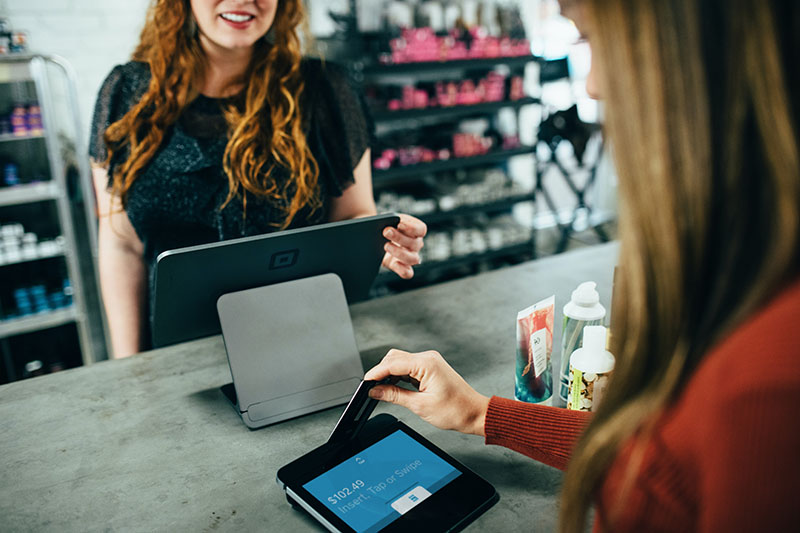
Imagine finding a limited-time offer online. It’s so perfect that you can’t waste time considering whether you should buy it. You quickly add it to your cart before anyone can beat you to it. You reach for your wallet, pull out your credit card and enter your information. In this moment, the thought of making a loved one happy is all that matters — and this gift would do just that.
Here’s the problem: Fraudsters know how excited people are to buy the perfect present. They recognize that getting someone to submit personal financial information online is not difficult. And they understand how easy it is to use that information against you once they have it.
Those reasons and more are why the holiday shopping season is a prime time for online scams. It’s easier than ever to open your laptop or use your smartphone to purchase what you want, all without leaving your home. Deals will appear in your email inbox or arrive via text. All you have to do is click one link to find what you want. While that can make shopping more efficient, it does not come without risks.
According to a study conducted by TransUnion in December 2022, the timeframe between Thanksgiving and Cyber Monday sees a staggering 82% increase in presumed fraudulent online activities originating from the U.S., compared to the average rates throughout the rest of the year.
VyStar Credit Union works hard to protect members from fraud, but when it comes to safely purchasing gifts online, it’s good to arm yourself with as much knowledge as possible before shopping.
Know What You Have to Spend
Before you begin shopping, it’s important to know your limits. VyStar’s Online & Mobile Banking platform allows you to access your account anytime from anywhere, and we’re committed to keeping your finances secure. Having easy access to your accounts means you can always keep a close eye on your debit and credit limits. It’s especially important to budget your money and avoid overspending during the holiday season.
It’s also good to stay informed about your current credit report. For years, it was hard to stay up to date on credit reports because it took a long time to track down the information, and by the time you had it in front of you, there was a good chance it was outdated. The COVID-19 pandemic changed that. The Federal Trade Commission points out the three national credit reporting agencies now offer access to free weekly credit reports permanently. These free credit reports were previously available only once per year.
It’s also important to use reputable sources when requesting information about your credit report. Fraudsters can easily mimic a company offering free credit reports, and signing up in the wrong place is an easy way to get scammed.
Does Something Sound Too Good to Be True?
It’s always nice to get a good deal, but if a deal sounds too good to be true, sometimes it is. According to the FBI, non-delivery and non-payment crimes are two of the most common ways fraudsters will attack during the holiday season. In one of the scenarios, you think you’re paying for something online, but the item you purchased never arrives. The other situation involves shipping something to a buyer that never gets paid for.
It’s a good rule of thumb to double and triple-check all the fine print before checking out. Take your time. The faster you go through the steps, the better the chance you’ll miss something that should be an obvious red flag. That’s especially true for making sure a website or organization is legitimate and secure.
Scammers are also well aware that people spend a lot of time on social media. Anyone with a Facebook or Instagram account has seen ads for the latest golf equipment or household appliances. Finding deals while scrolling through social media is possible, but it’s also possible to give away personal information. If an ad pops up on your feed, make sure it’s real. Go directly to the company’s website to see if the deal is available there. Always be careful when clicking on direct links you find on social media.
The Federal Trade Commission also warns against believing everything you read in social media messages, even if they’re from friends. Your friend’s account may have been hacked, so the FTC recommends calling them on the phone to check on the offer they’re suggesting. If they don’t know what you’re talking about, you should let them know their account may be compromised.
Scammers Finding New Ways to Strike
Scammers have several traditional tricks to get people to give them what they want. As technology improves, scammers find new ways to deceive their victims.
When it comes to online shopping scams, it's important to distinguish between “phishing” and “smishing.” Phishing scams usually come via email and aim to deceive you into sharing personal details by mimicking trusted entities. Smishing uses the same approach but via text messages. Both of these tactics exploit the urgency and trust associated with expecting a package, but they differ in the method of communication: email for phishing and text for smishing.
A smishing scam related to shipping and delivery typically appears as an urgent text message from what seems to be a reputable delivery service. The message might say something like, “URGENT: Failed delivery attempt for Package ID: 123456. Click here to reschedule your delivery.” The text will often include a hyperlink that appears to lead to the delivery service's website for you to “resolve” the issue. On the surface, the message aims to create a sense of urgency and necessity. Remember, take your time to figure out what’s really going on. The United States Postal Service has several helpful tools available if you’re unsure about how valid a text or email really is.
Once you click the link, you may be directed to a fraudulent website designed to look like the official site of the delivery service. Here, you may be prompted to enter sensitive information like your login credentials, home address or even financial information to “verify your identity” or “confirm the redelivery.” The primary goal is to collect your personal information for malicious use, ranging from identity theft to unauthorized transactions. “Every year thousands of people lose money to phishing scams,” said VP, Enterprise Authentication & Fraud at VyStar, Tim Charboneau. “Avoid being one of them by knowing what to look for. Scam emails, texts, and calls may pressure or even threaten you to respond. Your bank or credit union will never ask for your bank online password, your debit card pin or ever need you to send money to a different account. Please ignore these calls, texts, and emails, and call your bank or credit union directly.”
Online Shopping Tips
Shop from reputable websites: When making online purchases, always ensure that you shop from trusted and well-established websites. Look for secure website indicators such as "https" in the URL and a padlock icon in the address bar.
Use strong and unique passwords: Create strong and unique passwords for all your online accounts, especially those related to your financial information. Avoid using common phrases or easily guessable information.
Be cautious of phishing attempts: Fraudsters often use phishing emails or text messages to trick victims into revealing their personal information or login credentials. Be wary of unsolicited emails or texts asking for sensitive data or urging you to click on suspicious links.
Monitor your accounts regularly: Regularly review your bank and credit card statements for any unauthorized transactions or suspicious activity. Sign up for eStatements to securely access statements anytime, anywhere. Set up transaction alerts or controls that will notify you of any activity on your accounts.
Secure your devices: Ensure that all your devices have up-to-date antivirus software installed. Keep your operating system and apps updated with the latest security patches.
Use secure payment methods: When making online purchases, opt for secure payment methods such as a digital wallet, credit cards, or trusted third-party payment services like PayPal.
Be cautious of public Wi-Fi networks: Avoid making financial transactions or accessing sensitive information when connected to public Wi-Fi networks, as they may not be secure.
Trust your instincts: If something seems too good to be true or feels suspicious, trust your instincts and proceed with caution.
Shopping in Person Can Leave People Vulnerable
While more and more people are gravitating online to get their holiday shopping done, plenty of people still enjoy shopping in a store. As people are camping out to be the first in line or fighting crowds on Black Friday, there are also people among them looking to take advantage of the holiday rush. Be on the lookout for pickpockets in close quarters or credit card skimmers at gas stations. It also may seem obvious to keep valuables out of sight when you leave your vehicle in a parking lot, but it can make a huge difference. A bag with holiday gifts in it sitting on the passenger seat is exactly what someone is looking for. It will ruin your day if you return from shopping to find a broken window in your car and something valuable missing.
In-Store Shopping Tips

Keep an eye on your belongings: While shopping in-store, always keep an eye on your personal belongings, such as your wallet, purse or smartphone. Be cautious of pickpockets or individuals who may attempt to steal your information.
Protect your PIN: When using debit cards or entering your PIN at the checkout counter, shield the keypad with your hand to prevent anyone from seeing your PIN. For the most secure payment method, try using your digital wallet. This way, you won’t have to worry about protecting your PIN or tampered payment terminals.
Check for tampering: Inspect an ATM or payment terminal for any signs of tampering. If anything looks suspicious or out of place, notify store personnel or use a different machine.
Be cautious with receipts: Avoid leaving behind receipts that contain sensitive information, such as credit card numbers or signatures. Dispose of them properly by shredding or tearing them up.
Verify before sharing personal information: Be cautious when providing personal information to store employees or filling out forms. Only provide the necessary details and ask how the information will be used and protected. You may be asked to open a credit card or join a club, just make sure you aren’t sharing too much information in the wrong place.
Review your statements: Just like with online shopping, regularly review your bank and credit card statements for any unauthorized transactions or discrepancies. It’s another reason to sign up for eStatements and set transaction alerts or controls.
By following these online and in-store fraud prevention tips, you can shop confidently during the holiday season and protect yourself from falling victim to scams. Remember to stay vigilant and enjoy a safe and secure holiday shopping experience!
